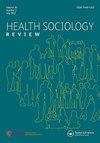Unsettling knowledge boundaries: the Indigenous pitiki space for Basotho women’s sexual empowerment and reproductive well-being
IF 2.5
2区 医学
Q2 HEALTH POLICY & SERVICES
引用次数: 2
Abstract
ABSTRACT Indigenous knowledge systems embody a holistic, inclusive view of the world and foreground interconnectedness for the promotion of life. Through reflective engagement with the author’s positioning as an Indigenous researcher, this article explores Indigenous knowledges of sexual, reproductive health and motherhood shared by Basotho women. It draws on the life stories of twenty never-married women and uses decolonial African feminist approaches to challenge the assumed universality of conceptions of sexual and reproductive health that are both deeply embedded and produced within specific relations of power. It illuminates the Indigenous pitiki space as an Indigenous knowledge hub purposed to empower Basotho women’s sexual and reproductive health. Within this space, Indigenous knowledges and skills are shared amongst women, with the elderly imparting knowledges to the young women. In the context of unsurmountable health disparities, the article shows how Indigenous knowledge-sharing outside the exclusive ‘westernised’ health systems enables communal support for the well-being of women and children in African contexts. It emphasises the need for inclusive and expansive knowledge production systems not only to better inform equitable health solutions for Indigenous communities but also for epistemic redress in the discipline of Sociology.令人不安的知识边界:巴索托妇女的性赋权和生殖福祉的土著皮提基空间
土著知识体系体现了一种整体的、包容的世界观,以及促进生活的前景相互联系。通过对作者土著研究人员定位的反思,本文探讨了巴索托妇女分享的关于性、生殖健康和母性的土著知识。它借鉴了20名未婚妇女的生活故事,并采用非殖民化的非洲女权主义方法,挑战根深蒂固并产生于特定权力关系中的性健康和生殖健康概念的假定普遍性。它阐明土著皮提基空间是土著知识中心,旨在增强巴索托妇女的性健康和生殖健康。在这个空间内,妇女之间分享土著知识和技能,老年人向年轻妇女传授知识。在无法克服的卫生差距的背景下,这篇文章展示了在排他性的“西方化”卫生系统之外的土著知识共享如何使非洲妇女和儿童的福祉得到社区支持。它强调需要建立包容和广泛的知识生产系统,不仅要更好地为土著社区提供公平的卫生解决方案,而且要在社会学学科中纠正认识上的错误。
本文章由计算机程序翻译,如有差异,请以英文原文为准。
求助全文
约1分钟内获得全文
求助全文
来源期刊

Health Sociology Review
Multiple-
CiteScore
7.50
自引率
0.00%
发文量
14
期刊介绍:
An international, scholarly peer-reviewed journal, Health Sociology Review explores the contribution of sociology and sociological research methods to understanding health and illness; to health policy, promotion and practice; and to equity, social justice, social policy and social work. Health Sociology Review is published in association with The Australian Sociological Association (TASA) under the editorship of Eileen Willis. Health Sociology Review publishes original theoretical and research articles, literature reviews, special issues, symposia, commentaries and book reviews.
 求助内容:
求助内容: 应助结果提醒方式:
应助结果提醒方式:


